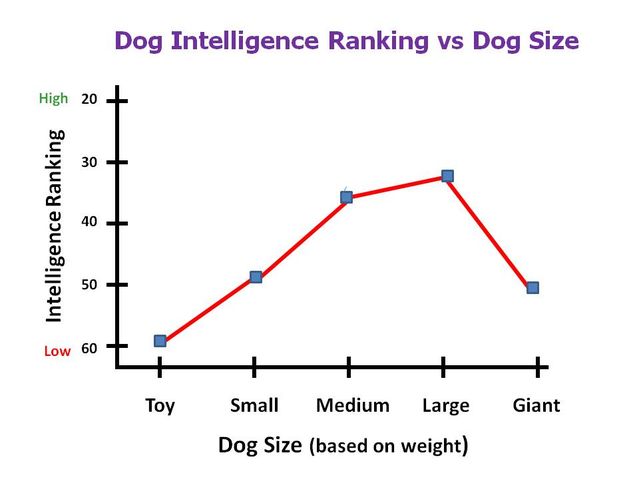
Does breed size affect a dog’s intelligence?
You have no doubt seen lists that indicate which dog breeds are the smartest. Although these lists may vary slightly, they usually have one thing in common – they are dominated by larger dog breeds. What about small dogs? Aren’t they smart? You may know that your Chihuahua or Miniature Poodle is a genius, so why are these breeds never included in these lists? We have collected complete information regarding the intelligence of small and large dogs. Keep reading to find out why your favorite small breed will never take the first cup.
Smart dogs
People have different mental abilities and quick wits – for example, some are inclined towards mathematics, while others may be musicians, artists or athletes – the same in dogs. The journal Psychology Today identifies three distinct categories of canine intelligence. They include:
instinctive intelligence. This is the ability of a dog to perform the tasks for which it was bred. For example, hounds are bred for tracking and hunting prey, while herding dogs are bred to herd sheep and cattle, and other working breeds are bred for specific tasks. This criterion shows how well dogs perform instinctive tasks. It also indicates how companion dogs are attuned to the mood and emotional cues of their owner. Every animal has a certain instinctive intelligence.
adaptive intelligence. This measure of intelligence determines how well a dog can solve problems without human intervention. For example, in order to extract a piece of food that has fallen into a hard-to-reach place without visual training, a pet needs adaptive intelligence.
Working intelligence. This intelligence measure measures how well and how quickly dogs can be trained to behave properly and perform tasks on command. Animals that perform well in this category tend to excel in obedience, agility, sports, and other types of training.
Lists of smart dog breeds usually focus on the third category and in most cases ignore the first two. According to the journal Psychology Today, large dog breeds between 25 and 40 kg perform best in the latter category, with very few exceptions.
Small Breeds vs Large Breeds
Does this mean that small dog breeds weighing less than 16 kg are stupid? Not at all. Many small dogs score well on other intelligence criteria. It is worth noting that IQ tests for dogs focus more on logic and problem solving than on obedience and trainability. So why do small dogs tend to score poorly in the latter category? There are several theories, we will consider them below.
Head shape
One outstanding study links the shape of a dog’s head to ease of learning, according to Psychology Today. The theory is that both dogs with short muzzles and flat noses (bulldogs and pugs) and dogs with narrow, elongated muzzles (greyhounds) were bred for specific tasks. The first ones are for fighting and guarding, the second ones are for running and chasing prey. Meanwhile, mesocephalic breeds — those with medium-sized heads like the Labrador Retriever — tend to lack that kind of specialization, which researchers say can give them greater cognitive flexibility, making them better at learning new tasks.
Temperament
A dog’s temperament can also affect its trainability and obedience. Breeds that commonly make lists for smart dogs, such as the Golden Retriever or the Border Collie, tend to be extremely friendly and eager to please. On the other hand, small dogs are often more headstrong and stubborn, as well as anxious and excitable, according to Psychology Today.
Some might argue that having a mind of their own actually makes small dogs smarter than their big, carefree brethren. As for fear and excitability, it is clear that the world seems scarier to small dogs than to large ones. Perhaps miniature dogs are too busy waiting for possible dangers, and could learn new tricks.
Owner influence
Another theory is that the not-so-good performance of small dogs in the obedience and training category has nothing to do with innate ability, but solely depends on their handling and training. A 2010 study in Applied Animal Behavioral Science found that small dog owners tend to interact with their dogs in ways that increase their aggression, excitability, and fearfulness and undermine obedience training.
For example, owners of small dogs are often less consistent in training and interacting with their pets than owners of large dogs. They tend to rely more on punishment (swearing and tugging on the leash) to correct the pet’s behavior, which only increases his fearfulness and aggression, according to the journal Psychology Today. The study also found that owners of small dogs tend to engage less in play and social activities, such as fetching or walking, which tend to make the pets more good-natured and obedient.
While it may seem that the lists of smartest dogs are dominated by larger breeds, the truth is that they are usually dominated by pets that are eager to please and are easy to train. Don’t get us wrong – it takes intelligence to learn good manners and perform certain tasks. And many of the breeds on the lists of smart dogs serve very well, they are police and military dogs, and they all command our respect.
But you know your dog best. If you are convinced that your little pet is very smart, you are not mistaken. The bottom line is that you don’t need a list to tell if your dog is smart—and your dog doesn’t have to be smart to be worthy of love and affection.





